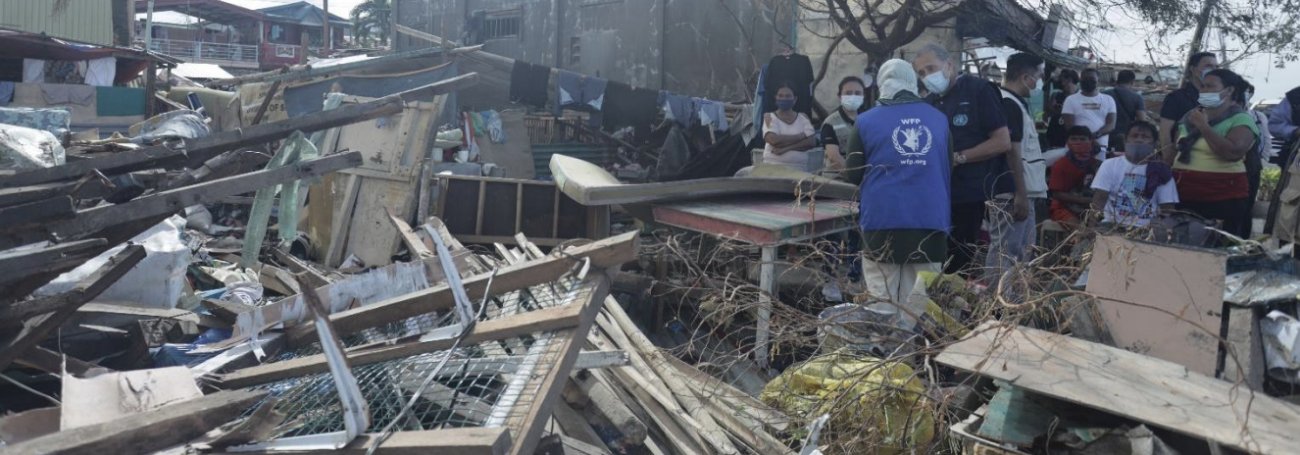Statement by Mr. Gustavo Gonzalez UN Resident Coordinator and Humanitarian Coordinator in the Philippines

Mr. Gonzalez went on a mission to Surigao del Norte, Dinagat Islands and Southern Leyte to assess the response to Typhoon Odette by IOM, UNFPA, UNICEF and WFP
On 16 December 2021, Typhoon Rai, locally known as Odette, swept through 11 of the country’s 17 regions. The typhoon brought with it torrential rains, violent winds, floods and storm surges affecting almost 12 million people. More than 2 million houses were damaged or destroyed, with over 424,000 destroyed and over 1,694,000 partially damaged. Approximately 32,203 people are still displaced with some living in evacuation center and others with relatives. The rapid approval of the USD12 million (628 million pesos) emergency grant by the United Nations Central Emergency Response Fund (CERF) on December 24 was crucial to address critical needs early in the response.
The funding channeled through IOM, UNFPA, UNICEF and WFP allowed the UN agencies and their partners to respond quickly and in a coordinated way to help support life-saving humanitarian activities complementing the government-led response and signaling the need for urgent additional resources. Around 247,000 vulnerable people in 20 most affected municipalities of the three provinces that were hardest hit by Typhoon Rai: Surigao del Norte, Dinagat Islands and Southern Leyte were targeted with the CERF funding. The CERF grant proved catalytic in mobilizing additional funding for the typhoon response with approximately $55 million (2.9 billion pesos) currently mobilized for the Humanitarian Needs and Priorities (HNP) plan.
Three months on and through collaborative partnership with the local government of the three provinces, I undertook a mid-term review on March 9-11 to Caraga and on March 14-16 to Southern Leyte to take stock of the initial progress and remaining gaps, with a particular focus on operational challenges and required actions in completing CERF activities. I was joined by key CERF supporters, Ambassador of Norway, United Kingdom and Canada, and Heads of Agencies of UNICEF, WFP, IOM, UNFPA and OCHA.
By acting quickly and generously, flexible CERF funding to the Philippines enabled a response to the most pressing needs, such as shelter, food security and water sanitation and hygiene (WASH) and protection. The CERF review mission highlighted that we should not be complacent, instead we should find ways to house those still without roofs over their heads as durable shelter for thousands of people whose homes were damaged or destroyed remains critical. More people are still in need of food, clean water and access to medicines and sanitation facilities with protection running through all operations. Access to education for children also needs to resume, especially where learning materials and schools were damaged by Typhoon Odette. Hundreds of thousands of people lost their livelihoods and need help getting back on their feet.
Over the last few days, I have witnessed impressive convergence of the UN agencies sharing knowledge, operations and purposes with a single common goal: to save lives, protect the most in need and set the ground for recovery. CERF remarkably allowed us to anchor UN relief response in ongoing government emergency plans and build promising partnership with a wide range of local actors.
The midterm review also identified a number of concerns related to the durable resettlement of some families within the context of the “No Build Zone” Policy as well as on post reconstruction investments in heavily hit areas. Those issues will be part of my discussions with key government representatives and development partners to jointly explore durable solutions.
With the effects of climate change being experienced world over, Philippines will continue bearing the brunt of major storms. For us to surmount these disasters, it is paramount that we continue working together to ensure effective and immediate response to disasters.
The revised HNP, with a total budget requirement of $169 million (8.9 billion pesos) targeting the needs of 840,000 of the most vulnerable people has been funded up to 32.6 per cent so far thanks to the generosity of the international community. I take this opportunity to call on the solidarity of our resource partners to redouble their support to fill critical short falls in our Humanitarian Needs and Priority Plan in the current critical circumstances of the response.
Note to Editors:
Download the Humanitarian Needs and Priorities (HNP) Plan here.
For more information, please contact:
Teresa L. Debuque
National Information Officer
United Nations Philippines
Email: debuque@un.org
Mobile number: 09150612351








